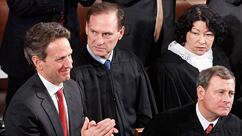
Quite a few people seem upset about President Obama’s remarks directed toward the Supreme Court during Wednesday’s State of the Union address. Obama criticized the court’s decision in Citizens United v. FEC, which rendered unconstitutional decades’ worth of congressional attempts to regulate corporate campaign spending.
“With all due deference to separation of powers, last week the Supreme Court reversed a century of law that I believe will open the floodgates for special interests, including foreign corporations, to spend without limit in our elections,” Obama said, to an audience that included six of the court’s nine justices. As Obama uttered these words, Justice Samuel Alito was seen shaking his head and mouthing the words “not true.”
When Supreme Court justices engage in what is called constitutional interpretation, they are by necessity making purely political decisions.
Obama’s criticism of the decision, and especially the fact that he delivered it in the presence of most of the court’s members, has thrown several law professors into a tizzy. “Has any president ever called out the Supreme Court by name, and egged on the Congress to jeer a Supreme Court decision, while the justices were seated politely before him?’ Randy Barnett of Georgetown spluttered. Barnett described this as “a truly shocking lack of decorum and disrespect toward the Supreme Court for which an apology is in order.”
Ann Althouse of Wisconsin badgered Obama for subjecting the justices to such a brutal verbal assault, and speculated that if “they were going to have to listen to that kind of in-your-face disrespect, they wouldn’t have done the president the honor of sitting there.” Blogger Glenn Reynolds volunteered that the president’s words were undignified, not presidential, and indeed “demagoguery.”
All this is nonsense. It’s nonsense because it is based on the assumption that, when justices of the Supreme Court decide politically controversial issues, they do, or at least ought to do, so on the basis of “the law” rather than “politics,” and that therefore the kinds of criticisms that would obviously be appropriate when directed at politicians are disrespectful demagoguery when uttered in the presence of these robed eminences.
The fact that this assumption is treated as uncontroversial by almost everyone in our political and legal culture does not render it any less absurd. Consider the Citizens United decision. Technically, the issue in this case was whether the free-speech clause of the First Amendment prohibits Congress from forbidding corporations to spend money directly on political campaigns, rather than limiting them to doing so through political action committees.
As a practical matter, there is quite literally no difference between the questions “does the First Amendment do this?” and “should the First Amendment do this?” The men who ratified the First Amendment lived in a world without anything even vaguely resembling the modern versions of corporations, political parties, political campaigns, media technologies, and a host of other things of crucial importance to debates regarding the best way to achieve campaign-finance reform.
Asking whether the document they drafted prohibits or permits the kinds of laws struck down by the Citizens United case is a nonsense question. It’s like asking what the Constitution tells us to do about global warming or health-care reform. In other words, if by “the First Amendment” one means nothing more mystical or mysterious than “an English sentence of 45 words, making some fairly general statements, written by men (as opposed to omniscient beings) 220 years ago,” then the First Amendment is of no use to anyone in regard to questions such as those presented by the Citizens United case.
This, of course, is why many people reject the very idea of “originalism” in Constitutional interpretation—the idea that constitutional issues should be decided on the basis of what the authors or readers of that document meant by it or thought it meant.
Yet the alternatives to originalism are, if anything, even less satisfactory if one wants to separate “law” from “politics.” For example, the idea of a “living Constitution,” whose meaning changes over time, is either an example of magical thinking, or code for “ we make the Constitution mean whatever we want it to mean.” And, if “the First Amendment” really just means Supreme Court precedents about the First Amendment, then such decisions are essentially an extremely confused and inefficient form of legislation. (This, in fact, is the most sensible way to think of them.)
When Supreme Court justices engage in what is called constitutional interpretation, they are by necessity making purely political decisions. Those decisions, and the justices who make them, deserve exactly as much respect as the decisions and the men and women who make them warrant.
In other words, in cases such as Citizens United, the distinction between “law” and “politics” is completely meaningless. By treating it as such in the context of his State of the Union address, Obama (a former constitutional law professor) did indeed breach the decorum of his former profession.
He also dealt with that distinction honestly. That doing so before the assembled dignitaries of the nation is considered disrespectful and undignified is a rather sad comment on the state of the union.
Paul Campos is a professor of law at the University of Colorado at Boulder.






